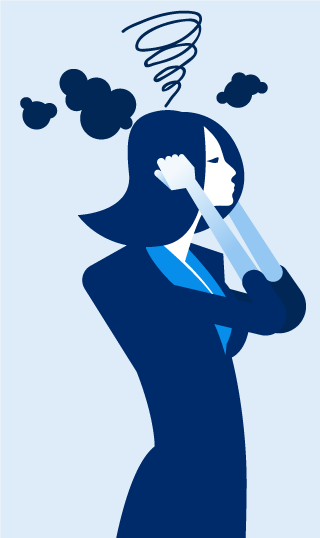Home / News & Events / Physical Health /
A New Approach to Chronic Pain and Anxiety

Opioid addiction continues to grow nationwide and kills three people in Tennessee each day. At a Centerstone clinic in Nashville, Dr. Alicia Batson offers clients an alternative to prescribed opioids and benzodiazepines in the treatment of chronic pain and anxiety—based on her personal experience.
Having always believed there was no separation between the mind and body, Dr. Batson received dual training in psychiatry and internal medicine. But it wasn’t until Dr. Batson had chronic pain herself—and spent 10 years searching for successful treatment—that she really understood how the mind and body interact in creating both pain and healing.
On the advice of her physical therapist and in desperation, she found Dr. Howard Schubiner’s website about Mind Body Disorders (MBS), also known as Tension Myositis Syndrome (TMS), Psychophysiologic Disorders (PPD) or Stress Illness. She knew within a few minutes of reading the pages that she had found what was wrong all this time, and that her healing was just a few steps away. And, in fact, that was true. Within a few months of treatment, her pain resolved and she was able to eventually complete her first triathlon, a life-long goal and a personal milestone for her recovery.
Since overcoming a vicious cycle of compounding pain and anxiety, she now helps others who suffer from undiagnosed chronic pain reclaim their lives.
Common Examples of Chronic Pain
Common examples of chronic pain may include:
- fibromyalgia
- irritable bowel syndrome (IBS)
- chronic interstitial cystitis
- migraine headaches
- inconclusive back or neck trouble
“Chronic pain is pain that persists more than three months and does not have a structural cause in the body,” says Dr. Batson. “The pain is coming from the brain, but it’s real. There’s nothing wrong with the body or the mind; what’s wrong is the input you’re getting. Specifically, the brain believes you are chronically in danger.”
Dr. Batson explains the brain has certain mechanisms designed for safety—for example, the “fight or flight” response meant to keep a person alive. But that sympathetic nervous system doesn’t work as well when it’s turned on for lengthy or recurring amounts of time.
Examples of such extended activation include responses to adverse childhood experiences, adult trauma (divorce, job loss) and self-destructive behaviors done subconsciously (self-criticism, people pleasing, constant worry).
“Any time you have a pain that concerns you in your body, you must go to a medical doctor first,” Dr. Batson says. “Ruling out life-threatening or treatable medical conditions is critical.”
Follow these 4 steps
When chronic pain and anxiety have no conclusive diagnosis, Dr. Batson says treatment involves “turning off the sympathetic nervous system” with four steps:
Psychoeducation
It’s important to understand that pain can come from the brain. Every person on the planet has had an episode of the brain causing a symptom in the body: a face turning red from embarrassment is a real physiologic change in the body, but it started in the brain.
Cognitive Behavior Tools
A person can learn to change the relationship with his pain and no longer let it control his life. This can eventually break the pain-fear-attention cycle which is driving the pain. Success can be measured by how little one allows pain to change a daily routine.
Learning Self-Compassion
Erase self-criticism, self-pressure, people-pleasing habits and chronic feelings of fear when dealing with chronic pain and anxiety. Learn to treat yourself in a positive way—with the same love and compassion you would give to a loved one.
Emotional Processing of Past Traumas
Many who struggle with chronic pain and anxiety can improve with psychoeducation and cognitive behavioral therapy alone, but some will need help processing repressed emotions from past traumas, which are driving the activation of the sympathetic nervous system.
A skilled therapist is an important component in the path to healing.
If you’d like help with chronic pain or anxiety, appointments with Dr. Alicia Batson can be scheduled by calling
(615) 460-4100
Office Hours: Dr. Batson’s hours are Tuesdays, Wednesdays and Thursdays from 8 a.m. – 4 p.m.
You can also reach check out Dr. Batson’s office location on our location’s page.
More about Dr. Alicia Batson
In partnership with Dr. Schubiner, Dr. Batson developed the chronic pain, anxiety and depression recovery program, Take Back Your Life, for Centerstone. She is on the board of the Psychophysiologic Disorders Association, a health education non-profit dedicated to advancing the diagnosis and treatment of stress-induced medical conditions. Dr. Batson currently works at Centerstone Tennessee where she helps guide others in their recovery from chronic pain.


